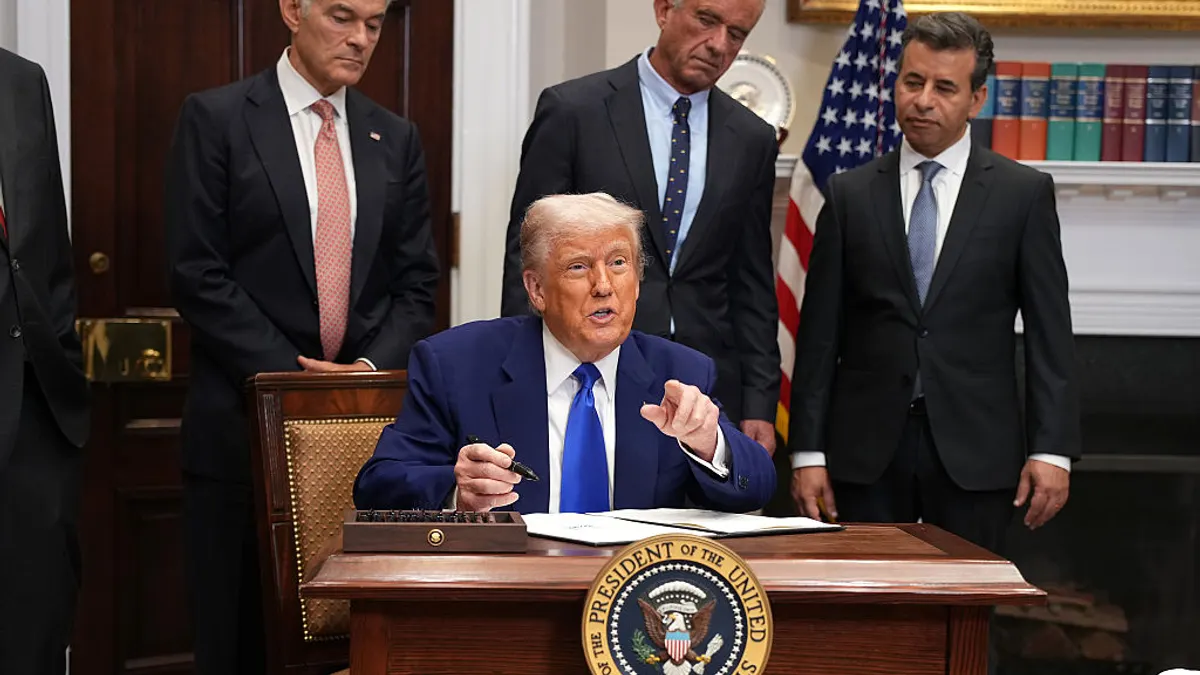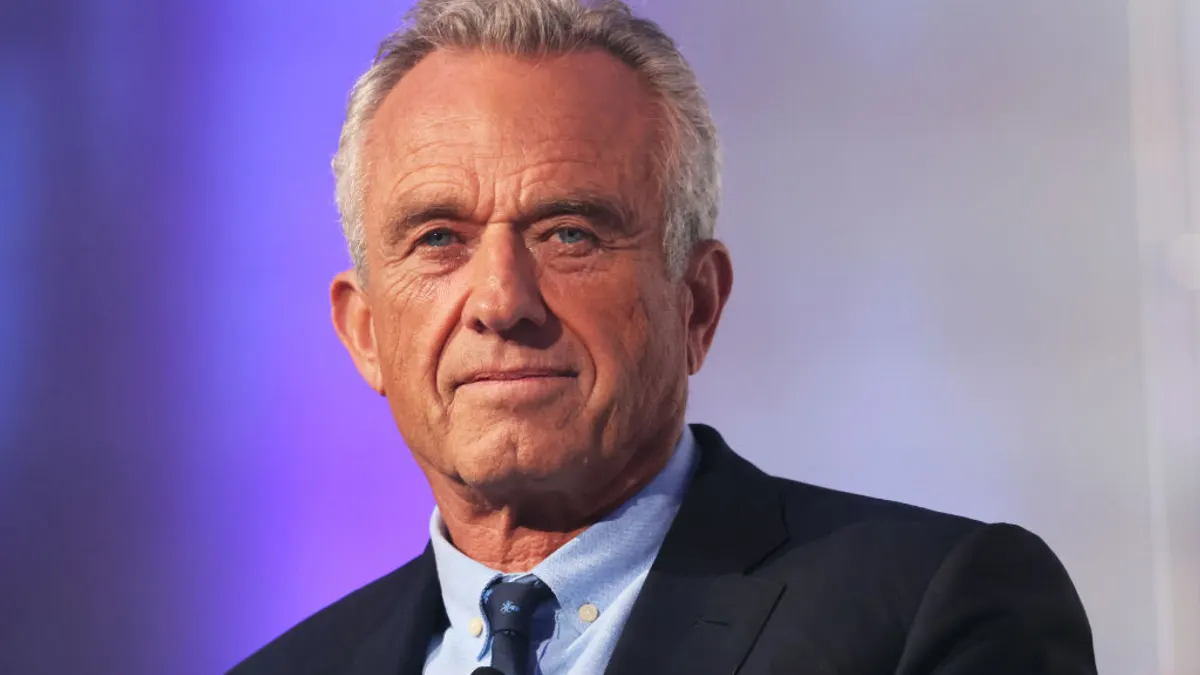President Donald Trump’s first swing at lowering drug prices last week has been considered a possible “win” for the pharma industry.
That’s because it directly addresses an aspect of the IRA’s Medicare drug price negotiation program known as the pill penalty, a particular ire of the pharma industry. The order also aims to boost transparency in the negotiation program, which Trump said has yielded “much lower savings than projected.” Beyond the IRA, the wide-ranging order touches on pharmacy benefit manager reform, high drug prices for seniors and hospital drug acquisition costs.
Notably, Trump cannot make many of the changes to address drug prices directly through an executive order, which is why HHS Secretary Robert F. Kennedy Jr. is directed to take charge on several fronts and report back to the president with reform plans. While not imposing immediate effects, the order provides insight into Trump’s priorities around the price of drugs.
During his first term, Trump attempted several actions to lower drug prices, such as his most favored nation model that would have ensured Medicare didn’t pay drug prices that were higher than those in other developed nations. The model was rescinded by CMS during the Biden administration. He also proposed requiring drug companies to disclose their prices in TV ads, though that policy was also never implemented. Other attempts at reform didn’t get far, either.
“Trump’s efforts to lower drug prices in his first term were largely ineffective,” said Michael Abrams, managing partner at Numerof and Associates, who also pointed to failed plans that would have changed how doctors buy and bill for drugs, how insurers pass drug rebates directly to patients and how hospitals purchase drugs through the 340B government discount program.
This time around, with renewed efforts to lower drug prices, Trump’s effectiveness will largely depend on the leaders in his administration. The order asks Kennedy to come up with solutions and proposals in several key areas to achieve lower prices.
“Whether any of the solutions generated are effective will depend on the creativity of those assigned to come up with potential solutions and the follow-through on those solutions deemed viable,” Abrams said.
Pill penalty fix
At the top of the new executive order’s priorities for pharma is the pill penalty, which Trump said threatens innovation and favors biologics. Currently, small molecule drugs are eligible for price negotiations sooner than biologics — nine years versus 13 years — and critics have said the law disincentivizes small molecule R&D. The order asks Kennedy to work with Congress to end “the distortion that undermines relative investment in small molecule prescription drugs.”
“We're already seeing it where research is being skewed from small molecules to biologics,” said Wayne Winegarden, senior fellow and director of the Center for Medical Economics and Innovation at the Pacific Research Institute. “Government policy shouldn't be influencing whether you're prioritizing biologics over small molecules. So I think putting those on parity is an important improvement of the current system.”
Congress already has a bill, the Ensuring Pathways to Innovative Cures Act, that would equalize the eligibility period between small molecule drugs and biologics.
The bill was introduced in the prior congressional session but failed to pass. Now, with the president’s backing, the political momentum could move the needle.
“I'm optimistic,” Winegarden said. “I think this is a politically achievable improvement over the current system.”
The move to fix the pill penalty is also an “indication” that Trump is unlikely to dismantle the Medicare price negotiation program in its entirety, Winegarden said.
When running for office, Trump repeatedly slammed other parts of the IRA, such as its climate change provisions, and the president froze disbursements for these programs in January. He also called the IRA “misnamed” in his order last week. These criticisms of the law led to some speculation that his administration would try to overhaul or repeal the Medicare price negotiation program overall, but the order suggests more modest reforms to the program instead.
PBM reform
The order also takes aim at PBMs, directing the secretary of labor to propose regulations to improve transparency around PBM fee disclosures, as well as asking leaders to come up with regulations that promote competition, efficiency and transparency in the pharma value chain and reevaluate the role of the middlemen.
“In general, tariffs will have, if anything, the effect of increasing the cost of medicines, not lowering them."

Michael Abrams
Managing partner, Numerof & Associates
Congress has been looking at potential PBM reforms for years without much action. Some states have taken up the issue on their own — Arkansas recently passed a law to ban PBMs from owning pharmacies. The move affects at least two of the nation’s largest PBMs, CVS and UnitedHealth, and other states are considering similar legislation.
The executive order’s focus on PBMs may help Congress push PBM reform over the line.
“I hope it revitalizes the efforts toward PBM reform that were happening in Congress,” Winegarden said.
The tariffs of it all
As Trump lays out his goals to lower drug prices, he has also weighed imposing tariffs on the pharma industry, which could negate those efforts.
“In general, tariffs will have, if anything, the effect of increasing the cost of medicines, not lowering them,” Abrams said.
Plus, if drugmakers, particularly those that produce generics, are forced to raise prices due to tariffs, they could run afoul of another provision in the IRA that requires manufacturers to pay rebates to Medicare if they raise prices higher than the rate of inflation.
“Manufacturers of branded pharmaceuticals will be in a better position to absorb the cost of tariffs by virtue of their margins than manufacturers of generics, who are mostly in highly competitive, low margin businesses,” Abrams said. “Raising the cost of generic products may trip punitive provisions of the IRA that apply to price increases in the course of a year that exceed measures of inflation. That conundrum may require presidential or legislative intervention.”
It’s not the only part of Trump’s overall plans that have confused experts. The order also directs Kennedy and FDA Commissioner Dr. Marty Makary to draft a report within six months illustrating how they can accelerate the approval of new drugs, including biosimilars, generics and second-in-class drugs. However, the order is scant on details and it’s unclear how the FDA or HHS could influence the industry to speed up these approvals while also upholding other patent reforms in favor of drugmakers through a small molecule fix for the IRA.
“The language sounds good, but I don't know what it means,” Winegarden said of the direction.


















